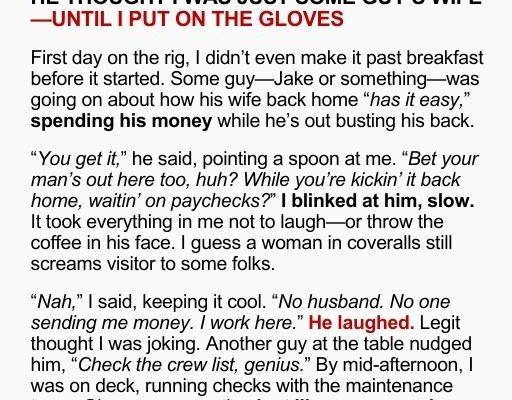I looked him dead in the eye, held up my gloves, and said, “I got this job the same way you did—through hard work and knowing what the hell I’m doing.”
He blinked. Didn’t have a comeback ready for that. Probably because, deep down, he knew I wasn’t bluffing.
My name’s Reagan. Not short for anything. I don’t wear makeup under my helmet. I don’t flirt my way out of hauling a thirty-pound torque wrench or crawling under pipelines in hundred-degree heat. And I definitely don’t take crap from guys like him.
The platform was somewhere off the Gulf, a floating slab of steel and noise surrounded by water and sky. You don’t come out here for peace and quiet. You come for the paycheck—and the challenge. I’d done time on land rigs, but this was my first offshore assignment. And yeah, I was nervous. You’d have to be crazy not to be. One wrong move and you’re either falling, frying, or going deaf.
But none of that scared me like the way men like Jake underestimated me. That was the real danger—when they assume you’re weak, they don’t look out for you. And out here, you need eyes in every direction.
By the end of the first week, I knew the rig’s layout better than half the guys who’d been here for years. I ran diagnostics faster, spotted a faulty weld before the sensors did, and even caught a pressure build-up that could’ve sent a pipe flying straight through someone’s chest.
But Jake? He kept giving me that sideways glance. Like he was waiting for me to slip up, to ask for help, to prove him right.
Then came the valve incident.
A 3000 PSI line had to be manually released for maintenance—standard procedure, but high-stakes. You mess it up, you flood the deck or worse, someone loses a limb. Our lead tech was down sick with food poisoning, and I stepped up. Everyone froze. Even the foreman paused, uncertain.
“You sure you got this, Reagan?” he asked.
Jake didn’t wait. He muttered, “Shouldn’t we get someone more experienced?”
That did it.
“I’ve done this ten times onshore,” I said. “You want to double-check my certs, or you want the job done?”
Foreman nodded slowly. “Let her work.”
So I did.
One by one, I bled the lines, rotated the release valves, kept an eye on pressure drops, and signaled the flush point like clockwork. Five minutes later, the rig’s hydraulics hissed into silence.
No flooding. No accidents. Just smooth, textbook work.
The deck crew stared. A few gave me nods. One guy clapped me on the back.
Jake didn’t say a word. Just walked away, red-faced.
The next day, he didn’t make eye contact at breakfast.
But that wasn’t the end of it.
The last week of my three-month stint, a storm rolled in. Not the kind you dodge by heading indoors, but the kind that throws waves like fists and turns the deck into a skating rink.
We had a shut-in drill. Everyone had to gear up and run the emergency sequence, including manually locking down the flare stack.
Guess who got assigned to the stack with Jake?
We harnessed up, clipped into the storm line, and crawled our way to the exposed section of the platform. Rain lashed sideways. Wind howled like a jet engine. I couldn’t hear a thing except static in my comms.
Jake slipped first—boot hit a slick patch of oil residue. He slammed onto the grating and nearly went over the edge if not for his clip. His eyes were wild, panicked. He tried getting up, but his ankle wasn’t having it.
I crouched beside him, wedged my boots for leverage.
“You good?” I yelled.
He shook his head. “Think it’s sprained. Maybe worse.”
I could’ve called it in. Could’ve waited for backup.
But time was short. And the flare stack wouldn’t wait for another crew.
So I did both jobs.
I hauled Jake back along the line like he weighed nothing, got him secured inside the access chamber, then climbed the final leg of the ladder to the flare housing. My fingers were numb, muscles burning. I’d trained for this, but nothing compares to doing it in real life, soaked to the bone, with a guy who once laughed in your face watching through the fogged-up porthole.
I turned the release lock, reset the failsafe, and got back down with barely a second to spare before the automated override would’ve forced a system shutdown. That would’ve cost the company half a million in lost time. Maybe more.
Back inside, Jake sat slumped against the wall, holding his ankle. I unclipped, yanked off my gloves, and handed him a water bottle.
He took it without looking at me.
Then finally, he said, “Thanks.”
I nodded. Didn’t gloat. Didn’t say I told you so.
But later, when the foreman came over and told me corporate had heard about the save, and that they were considering me for lead on the next rotation, I couldn’t help the grin that spread across my face.
Three months ago, I was “some guy’s wife” in the galley, apparently living off imaginary paychecks.
Now?
I was Reagan Cross, the rig’s first female shift lead, and nobody doubted why anymore.
When the chopper took me back to shore that final morning, I looked down at the shrinking platform—just a speck in the sea—and I felt it. That quiet, deep pride of earning every damn inch.
So here’s to the ones they underestimate. The ones they don’t see coming.
Because sometimes, all it takes is putting on the gloves.
Like what you read? Share it with someone who needs a reminder that grit always speaks louder than doubt.



